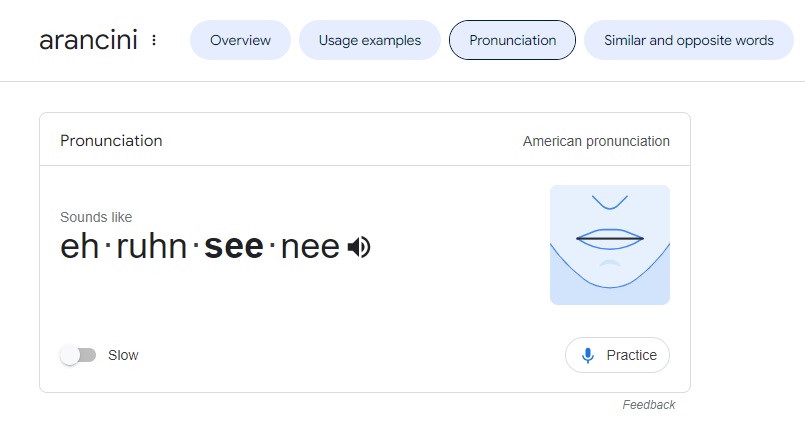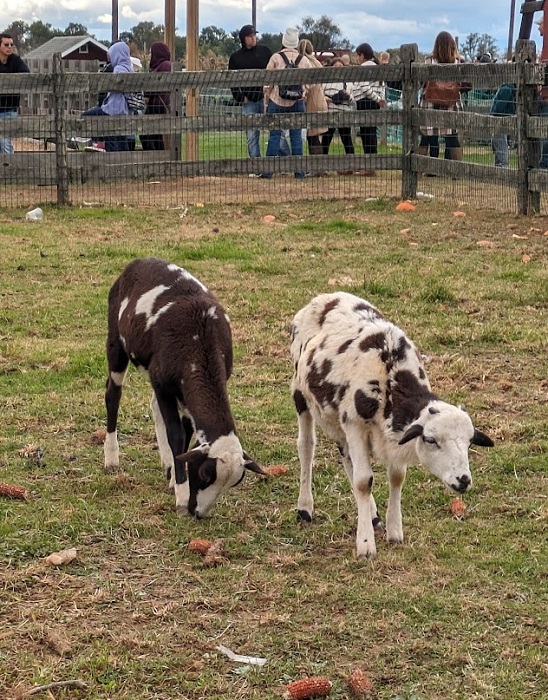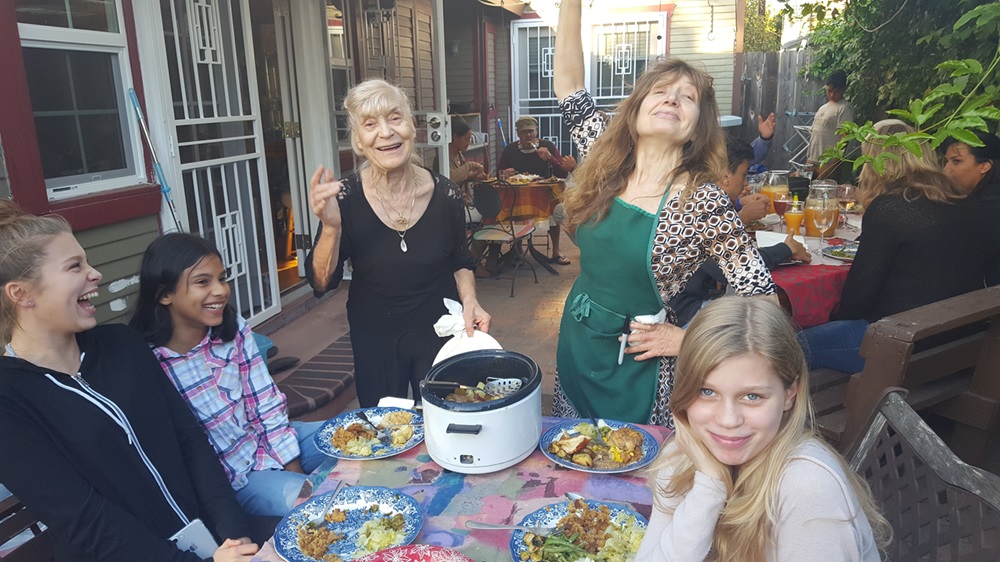The Power of Self-Doubt

A few weeks ago, Rand and I went out to dinner at a restaurant we hadn’t tried before. The menu was mostly Pacific Northwestern – so, lots of fish and expensive – with a few Italian dishes thrown in. We settled on a couple of things, one being arancini – tiny little fried balls of risotto. It’s a Southern Italian dish, but not one my family ever made at home. Risotto was rarely consumed in my house growing up. My grandfather refused to eat it, out of what I now suspect was a long-standing and entirely justified grudge against Mussolini. (Because the wheat for flour had to be imported, the fascist dictator tried to get Italians to abandon pasta for rice, which grew well in Northern Italy. This plan did not go over well.)
The word arancini means oranges – the singular being arancio. (Which is sort of how the fried balls of rice look – nubby and spherical and orange-brown in color). So while I didn’t eat the dish growing up, I’m very familiar with the word itself. I grew up speaking Italian. And now, well, I write about food.
“We’ll take an order of the arancini,” I said, pronouncing it a-ran-chee-nee.
“See nee,” the waiter muttered.
I stared at him, confused as to what this command meant.
“Sorry?” I asked.
“See nee,” he repeated. And he looked distinctly annoyed, and a little embarrassed for me. “It’s a-run-see-nee.”
And with that, my soul quietly left my body.
My Italian is corrected on a daily basis, usually by a family. I’m not a perfect speaker, largely because Italian grammar is an absolute beast. My aunt taught college-level Italian for years and some days even she’s stumped. And pronunciation of words can be really hard, because the rules in Italian are so different than the rules in English. The letter c is particularly confusing for English speakers.
The letter c is pronounced like a hard k in Italian if it’s followed by an a, o, or u. Think carbonara or Coppola.
But if the c is followed by an i or an e it makes the sound we would associate with a ch in English. Think DaVinci. (I literally cannot think of another example that made it into English)
From there, it gets WILDLY confusing. Because if you want to make that hard k with an i or an e following it, you have to add an h. So chianti isn’t pronounced chee-ahn-tee but kee-ahn-tee. (Here’s a site that does a great job of explaining it better than I ever will.)
The weird thing is, growing up speaking Italian, I often know how to pronounce something, I just don’t know why. It’s like how we know lots of rules as English speakers that are innate, but we can’t explain them (like why “south” and “uncouth” don’t rhyme). The bottom line is this: unless someone asks me, I will not correct someone’s pronunciation of Italian words, because it doesn’t really matter!!! Also, I’m not a pretentious jerk like that. (I’m a pretentious jerk in other ways.) Making mistakes is part of learning a language or even speaking one you know well – we’re all constantly doing it.
But.
As soon as the waiter corrected me, I thought: Maybe he is right?
Maybe I, and everyone in my family, and the entire country of Italy have been pronouncing it wrong this entire time? MAYBE IT IS A-RUN-SEE-NEE?
(It is not.)
I LITERALLY WENT TO GOOGLE TO FIND OUT IF ITALY WAS WRONG AND THIS KID WAS RIGHT. AND GOOGLE SAID HE WAS.
 At this point, I was quietly losing my mind. I was officially being gaslit by the internet. It’s like if someone came up to you and said, “Actually those long yellow fruit are pronounced beneenees,” and you’re like, “You know what, that doesn’t sound right, BUT YOU SOUND SO CONFIDENT AND GOOGLE IS CONFIRMING IT, maybe I’m just low on potassium and my brain isn’t working. I SHOULD EAT MORE BENEENEES.”
At this point, I was quietly losing my mind. I was officially being gaslit by the internet. It’s like if someone came up to you and said, “Actually those long yellow fruit are pronounced beneenees,” and you’re like, “You know what, that doesn’t sound right, BUT YOU SOUND SO CONFIDENT AND GOOGLE IS CONFIRMING IT, maybe I’m just low on potassium and my brain isn’t working. I SHOULD EAT MORE BENEENEES.”
Like, this is a language that I have been speaking since I have known how to speak. And I was ready to throw out FORTY-THREE YEARS OF KNOWLEDGE because a 24-year-old whose retirement plan is definitely crypto told me otherwise.
I looked closer at the Google instant answer. In the corner it said “American pronunciation.” And in the links below were tons of Italian cuisine sites explaining how to pronounce the word.
I was pronouncing it correctly. Or at least, the Italian way. (Again, none of this matters.)
But my self-confidence was so easily rattled by someone who didn’t know what they were talking about, just because they seemed so sure of themselves. It made me literally question how to pronounce the word orange. In the face of someone (let’s be honest: usually a dude) with a contradicting belief and a condescending attitude, I immediately throw everything I know out the window. They believe in themselves more when they’re totally wrong than I do when I’m right.

The confidence gap – the discrepancy in self-confidence between men and women – is prevalent throughout our society, and along with it comes imposter syndrome – the idea that maybe we haven’t earned or aren’t worthy of our achievements and success. A year before she published Lean In, Cheryl Sandberg told The Atlantic, “There are still days I wake up feeling like a fraud, not sure I should be where I am.”
CHERYL SANDBERG, WHO IS SUPER SUCCESSFUL AND SOLD A BUNCH OF BOOKS TELLING US ALL TO BELIEVE IN OURSELVES, WAKES UP FEELING LIKE A FRAUD. So honestly, what hope do the rest of us have?
Several studies reported in that same article found “men overestimate their abilities and performance, and women underestimate both” even when their performances did not differ in quality.
It’s a huge and prevalent problem. Women are very afraid of being wrong, because there are serious consequences when we are. One study reported by The World Economic Forum found that women and minorities face much harsher consequences for workplace mistakes than their male counterparts. According to an article in Elle Magazine, women often hold ourselves to higher standards and take failures personally. “Often, low self-confidence and negative stereotypes about women’s abilities create a vortex pulling women’s achievement lower.”
According to The Atlantic, competence is kind of irrelevant when it comes to confidence. Confident people believe in themselves, whether or not it’s justified. And you can’t just pretend, because other people will apparently be able to tell you’re full of it. So we can’t fake it until we make it. We actually have to believe in ourselves.
This is a terrifying proposition. I’m doing my best in the face of it. Reminding myself that maybe one viral post or story would be a fluke. But several is not. I’ve written a book about travel and growing up in an Italian family, and another about food and feminism that’s coming out next year (pre-order it now!). Maybe book deals and bylines in major papers don’t just happen. Maybe some of it is luck, but some of it is talent and skill. Maybe I know a thing or two about food, and feminism, and words.
Maybe I can stop saying maybe.
A few weeks later, I found myself at a pumpkin patch with friends. A small petting zoo was in the middle.

A toddler ran up excitedly.
“COWS!” he shouted.
“No,” his mother said gently, “Those are not cows.”
“Those are cows,” his father said, sauntering up.
“Those are cows?” she repeated. “Oh. Maybe I don’t know what cows look like.”
I turned around to look. The pen was filled, exclusively, with goats.








